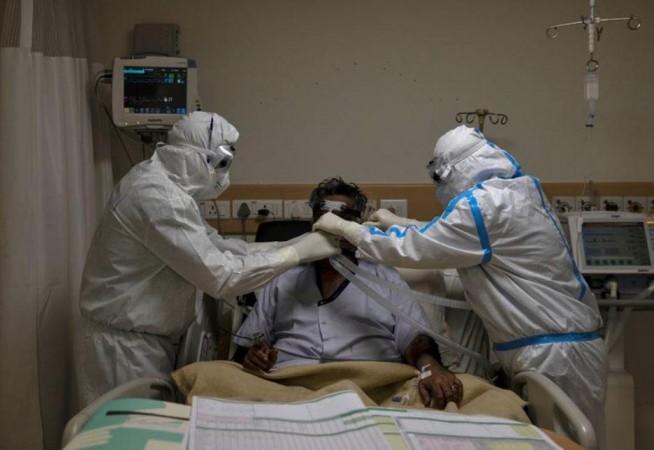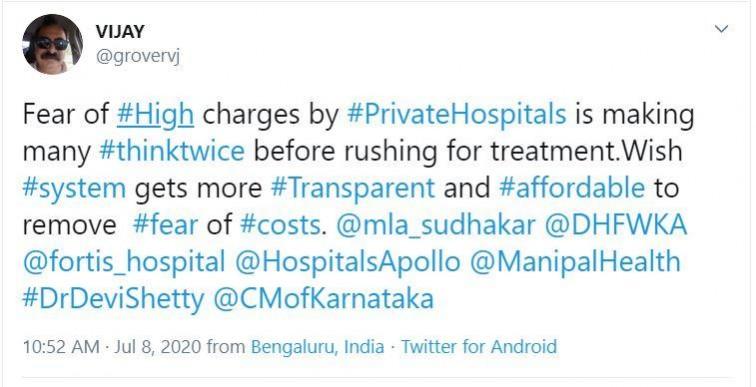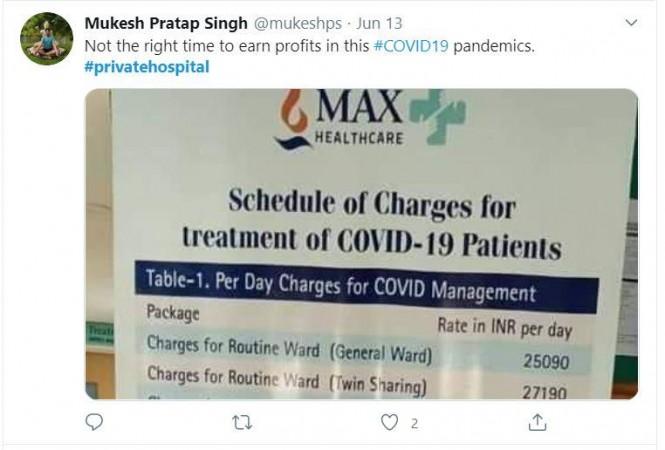
As the cases of coronavirus are surging across the country and beds filling up fast, many are rushing to private hospitals for the treatment of COVID-19 after being told that government hospitals do not have rooms available to admit any more patients.
Going to private hospitals, for many, is turning out to be a matter of double whammy. The reason, they say, is the exorbitant fee they are being charged by private hospitals for the treatment of COVID -19 patients.
High fees in spite of cap on treatment price
This is happening even after the government has fixed a cap on maximum charges both-government and private hospitals-can charge for hospitalisation and treatment of COVID 19 patients.

Though the government is taking steps and questioning private entities for charging high amounts from the public, the uniformity in charges for COVID-19 treatment is still elusive.
Govt fixed the rate cap after complaint aginst private hospitals
It can be remembered that the Karnataka government on June 23 had issued a circular notifying the rates hospitals can charge people for the coronavirus treatment and reserving 50 per cent of beds in private hospitals for the patients referred by government hospitals.
Click here for coronavirus related stories
According to the tariffs fixed by the government, patients referred by public health authorities (PHAs) in the general ward will cost Rs 5,200, Rs 7000 for High-dependency unit (HDU), Rs 8,500 for isolation ICU without a ventilator, and Rs 10,000 for isolation ICU with the ventilator.
As for patients being directly admitted by private hospitals without being referred by public authorities, making a cash payment, will be charged Rs 10,000 for the general ward, Rs 12000 for HDU, and Rs 15000 for isolation ward without a ventilator, and Rs 25, 000 for an isolation ward with the ventilator.
Despite this, there are complaints against private hospitals of them charging way more than the stipulated amount for the treatment.
'Rates for COVID 19 treatment in private hospitals not fair'
However, private hospitals both big and small are not happy with the rates that the government has set and plan to appeal to revise the rates.
"We had given subsidised rates for Ayushman Bharat patients and they have accepted it. We do not mind that, as it is our contribution to society. However, there needs to be a better rate for cash patients. Unfortunately, the price has been reduced drastically, especially for ICU, and this will impact us. We will appeal for a change in both categories for ICU charges," Dr Nagendra Swamy, principal co-ordinator of the Federation of Healthcare Associations, Karnataka (FHAK) told TINE.

Private doctors association say that the government's cap on the treatment amount is not fair as it hasn't included charges for other medical conditions that patient might have.
It also says that even for the treatment of COVID-19 there are many high-end antibiotic and drugs and these rates specified by the government will not be enough.
Public health experts also not happy with capped rates
It's not only private hospitals that are unhappy with the rates. Public health experts are also not in favour of the current rate, but for a different reason.
Researcher and public health official Dr Sylvia Karpagam said, "It is well known that these packages are not comprehensive and will require out-of-pocket payment for co-morbidities and complications. For example, if a diabetic patient develops an injection abscess, it will not be covered by the 'package'. This is deliberately left vague. The package incentivises private hospitals to put people into ICUs and on ventilators only because the reimbursement is higher. It is not uncommon for patients to be 'over-treated' in such situations."
This in combination with other charges like a hospital bed, food, care, various tests could push the treatment charges upward.
They also mentioned that some times admitting new patients mean setting up separate facilities with all infrastructure in place without disturbing existing patients. This, too, add up the cost of treatment given to the patients.

















